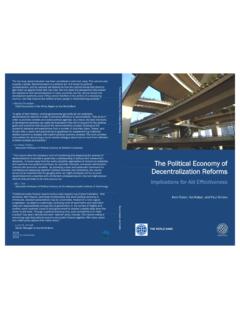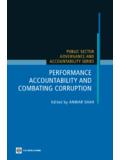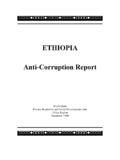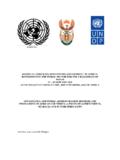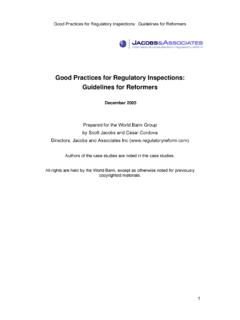Transcription of Myths and Realities of Governance and Corruption
1 CHAPTER and Realities ofGovernance and CorruptionDANIEL KAUFMANN,1 World BankGovernance and Corruption remain controversial and mis-understood topics. But they are now given higher priorityin development circles and by the corporate sector,including , some donors and international financial insti-tutions (IFIs) increasingly work with emerging economiesto help reduce Corruption , and increase citizen voice, gen-der equality, and 2005 WorldEconomic Forum in Davos highlighted the agreementreached among 63 multinationals in key sectors to workwithin a set of principles to control corporate , with 29 countries having ratified already, andanother handful of developing countries on the verge ofdoing so,2the UN convention against Corruption signedalmost two years ago is about to come into force, requir-ing, among other things.
2 Repatriation of looted assetsstashed abroad by corrupt when in July 2005 the Group of Eight countriesannounced their decision to double aid and debt relief tothe poorest countries in Africa, Governance concerns wereprominent. As the recent joint report by the AfricaCommission explicitly stated, Good Governance is Unless there are improvements in capacity, account-ability, and reducing Corruption .. other reforms will haveonly limited impact. Similar statements are voiced inother regions of the world, and there is also increasingscrutiny about Corruption in OECD countries, and is good Governance and controlling corruptionreally fundamental for growth, development, and security?
3 The explosion of empirical research over the past decade,coupled with lessons from countries own experience, havegiven us a more solid basis for judging many of the effectsof Governance on development, and the effectiveness orlack thereof of strategies to improve it. In our contribu-tions to the Global Competitiveness Reports(GCR) in recentyears4we have presented a number of selected governancetopics. Insights derived from the analyses of the ExecutiveOpinion Surveys (Survey) conducted by the WorldEconomic Forum every year, and presented in previousGCR chapter contributions, include the study of determi-nants of Governance at the city level, the anatomy ofundue influence, state capture and bribery involving manydomestic private firms, multinationals, and public officials,and the links between Governance , Corruption and securitythreats, and businessYet in spite of the myriad contributions to the field bymany authors, there are still serious unresolved questionsand debates in the development community, not onlyabout the importance of Governance and Corruption .
4 Butalso about the willingness and ability of the : Myths and Realities of Governance and Corruptioncommunity, including the private sector, to help countriesimprove in these this year s chapter, we provide a synthesis of thekey challenges, many of which are unresolved or havebecome popularized notions. Some of them, we believe,are outright Myths . At the risk of oversimplification, andfor the sake of expositional clarity and generating debate,we present these unresolved or misunderstood issues asmyths on Governance and Corruption , although weacknowledge at the outset that there is often a morenuanced reality. In each case, we present a myth, withwhich we obviously disagree, and then discuss why wethink it is mistaken.
5 Following the eight Myths , we presentunderemphasized interventions in the area of transparencyreform, complemented by improvements in freedom ofthe press and gender equality. If implemented, suchreforms could have a major impact on improving gover-nance and anti- Corruption in the next #1: Definition: Governance and anti- Corruption areone and the define governanceas the traditions and institutions bywhich authority in a country is exercised for the includes: the process by which those in authority are selected,monitored, and replaced (the political dimension); the government s capacity to effectively manage itsresources and implement sound policies (the econom-ic dimension); and the respect of citizens and the state for the country sinstitutions (the institutional respect dimension).
6 By contrast,corruptionis traditionally defined more nar-rowly as the abuse of public office for private gain. Inlast year s GCR chapter on Governance , we challenged thisdefinition of Corruption as placing too much emphasis onpublic office, and on the ostensible legality of the the implications of viewing Corruption as abroader phenomenon where private agents also shareresponsibility, and where many acts which are not ethical(and thus may be regarded as corrupt) may not necessarilybe presented empirical evidence of the extentto which many powerful private firms engage in undueinfluence, to shape state policies, laws and regulations, fortheir own benefit.
7 Related to this, we also highlighted theextent to which they make campaign contributions, whichmay, in fact, be legal, but which unduly influences therules of the game, for their benefit. Moreover, from theSurvey results we showed that favoritism toward particularfirms in the awarding of public procurement bids andcontracts is generate debate, we offered an alternative, broaderdefinition of what constitutes Corruption , namely, theprivatization of public policy, in which public policy isseen as including access to public services. According tothis more neutral definition, an act may not necessarily beillegal for it to be regarded as corrupt in a broader the situation in which legislative votes or execu-tive decisions in sectoral policy-making , in telecom-munications or energy have been unduly influenced byeither private campaign contributions to legislators, or byprivate favors provided to decision-makers.
8 In such a case, Corruption would be considered to have taken place, evenif the act was not strictly illegal. And within such a broaddefinition, responsibility resides with both those who exertundue influence, and those who are unduly onthe empirical results from the Survey last year, we alsoprovided an illustrative index of Corruption within thisbroader definition, which pays closer attention to thedeeds of the private found that a number ofrich OECD countries fare rather poorly when this moresubtle, and not purely legalistic, definition of Corruption isused in the debates on alternative definitions of corruptionnotwithstanding, it is clear that the scope of the conceptof Governance is much broader than that of Corruption .
9 Aswe will see later, Governance and Corruption may be relat-ed, but they are distinct notions, and ought not to beregarded as one and the #2: Governance and Corruption cannot be than a dozen years ago, few comparable, worldwidemeasures of Governance or Corruption inrecent years, through the efforts of institutions such as theWorld Bank (the Governance Indicators), the WorldEconomic Forum (the Executive Opinion Survey),Transparency International ( Corruption PerceptionIndex), Freedom House (political and civil liberties andfreedom of the press), and numerous other institutions, wehave sought to counteract this widespread the World Bank, in order to more closely defineand measure Governance , we have constructed these aggre-gate Governance Indicators, which now cover more than200 countries, based on more than 350 variables, obtainedfrom dozens of institutions worldwide, including Governance Indicators capture six key dimen-sions of institutional quality or Governance , and measure,through two indicators each, the political, economic, andinstitutional dimensions of Governance described following six dimensions are and accountability measuring political.
10 Civil andhuman : Myths and Realities of Governance and instability and violence measuring the likeli-hood of violent threats to, or changes in, government,including effectiveness measuring the competenceof the bureaucracy and the quality of public burden measuring the incidence of market-unfriendly of law measuring the quality of contractenforcement, the police, and the courts, as well as thelikelihood of crime and of Corruption measuring the exercise of publicpower for private gain, including both petty andgrand Corruption , and state captureWhile the Governance Indicators may represent a big stepforward, there are measurement challenges.
